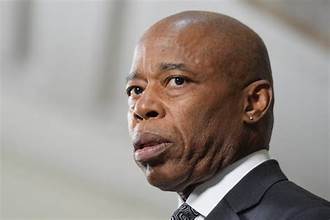Opinion | Why the dismissal of charges against Eric Adams is actually a win for the rule of law

On Thursday, U.S. District Judge Dale E. Ho dismissed corruption charges against New York Mayor Eric Adams with prejudice. While the order ends Adams’ criminal problems for now — and gives the Justice Department what it wanted, in part — do not let anyone spin this away from the most important and lasting takeaway from the judge’s detailed and thoughtful 78-page opinion: The rule of law and prosecutors from the Southern District of New York and the Justice Department who resigned rather than carry out what they saw as an unethical, improper and potentially illegal order were 100% vindicated by Judge Ho’s extensive findings.
First, Judge Ho completely demolished the purported rationales Justice Department leadership gave for the requested dismissal of the indictment in its motion before the court. The claim that the Adams indictment was tainted by “appearances of impropriety” and was “unsupported by any objective evidence” was wrong and instead the record shows that the SDNY prosecutors who worked on this case followed “all appropriate Justice Department guidelines.” The judge made a point to say that there “is no evidence — zero — that they had any improper motives.”
The court also took great issue with the Justice Department’s claim that this case — which was brought nine months before the 2025 New York City mayoral primary election — somehow amounted to “election interference,” pointing to informal Justice Department guidance about a “60 day rule” and the timing of past comparable public corruption prosecutions, among other reasons. The judge went so far as to call the rationales the Justice Department presented in its motion for the dismissal to be not just “thin but pretextual.”
As a prosecutor for over 20 years in federal and state court, I can tell you with absolute certainty that having a judge call your arguments “pretextual” would be a moment of great embarrassment and even concern about compliance with ethical rules. The fact that the judge was speaking of rationales put forth by the deputy attorney general, Todd Blanche, and the acting deputy attorney general, Emil Bove, is all the more stunning.
The judge ultimately dismissed the case against Adams — not because the reasons the Justice Department gave warranted it, but because of separation of powers and the practical consideration that a court cannot force the Justice Department to continue with a prosecution to which it will not commit resources.
Still, there was no way this judge was going to allow the Justice Department to have the charges hanging over Adams’s head (dismissal without prejudice as the Justice Department requested). Why? Because to do so would be tantamount to “harassment” of Adams by the Justice Department. Again, that is a truly remarkable conclusion by a federal judge for which the leaders of the Justice Department (especially ones claiming to want to depoliticize it) should be hanging their heads in shame.
The real reason the Justice Department wants to have the case dismissed? Judge Ho finds that the record “points towards an uncomfortable conclusion: that the decision to dismiss this case was apparently premised on the Mayor taking subsequent immigration-related actions in conformity with the administration’s policy preferences.” In other words, at least “possibly a quid pro quo arrangement.” Let that sink in for a moment.
A federal district judge said after extensive fact finding that the most likely real reason the Justice Department wanted historic charges dismissed against a sitting mayor was “a bargain” in which the “federal government is using the pendency of a federal indictment to override the City’s laws in favor of its own policy goals.” Even if it is not an explicit quid pro quo, the use of criminal laws for this kind of political horse trading is “clearly contrary to the public interest and a grave betrayal of the public trust, because it would violate norms against using prosecutorial power for political ends.”
Yet again, let that sink in. It is very rare to see a federal judge excoriate the methods and motives of the Justice Department’s leadership, because it has not been often warranted under other Justice Department leadership.
Already, Adams and Trump’s Justice Department are trying to give the impression that this decision is a vindication for Adams and the Justice Department’s position that the case was “political weaponization.” In fact, nothing could be further from the truth — both Adams and the Trump administration are trying to obscure the reality of this whole ugly incident and the resolution.
There are, however, two important things that the judge’s opinion do vindicate: first and foremost, the rule of law. Cases come and go, but we have a federal district judge relying on the rules of ethics, professional responsibility and the law to say that political favoritism in prosecutorial decisions is wrong and that that is what this Justice Department was trying to do.
Second, the decision vindicates the actions and the rationales of the numerous attorneys in the Southern District of New York and at the Justice Department who resigned at great personal sacrifice to themselves based on principle rather than sign on to this improper motion to dismiss, which, as the judge so eloquently said, was “difficult to square with the words engraved above the front entrance of the United States Supreme Court: ‘Equal Justice Under Law.’”
CORRECTION (APRIL 4, 2025, 10:07 a.m. ET): A previous version of this article incorrectly identified Emil Bove’s current position. He is the principal associate deputy attorney general: he was previously the acting deputy attorney general.
_____________
This article was originally published on MSNBC.com



